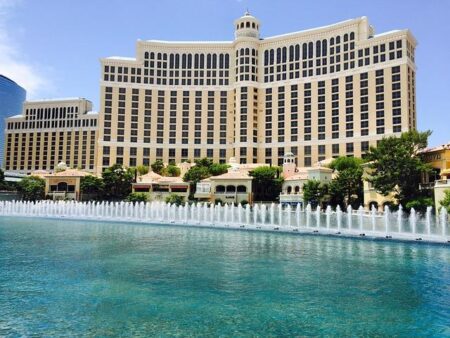How U.S.-China Trade Frictions Are Reshaping Las Vegas Tourism
Impact of U.S.-China Trade Disputes on Chinese Visitor Numbers in Las Vegas
The escalating trade disagreements between the United States and China are increasingly casting uncertainty over Las Vegas’s tourism sector, which has historically depended heavily on Chinese travelers. Experts in the tourism industry caution that ongoing diplomatic strains may result in fewer Chinese tourists due to stricter visa regulations, rising travel expenses, and waning consumer confidence. Although Las Vegas continues to promote itself through culturally tailored events and targeted advertising campaigns, these efforts may be overshadowed by broader economic and political challenges in the near term.
Businesses within the hospitality and entertainment industries are preparing for potential shifts in visitor demographics. Key concerns include:
- Decline in group tours from China as visa approvals become more stringent.
- Reduced spending on luxury goods and souvenirs due to tariffs increasing costs.
- Unpredictable travel policies that could discourage spontaneous bookings.
| Challenge | Expected Outcome |
|---|---|
| Visa Approval Delays | Longer processing times leading to fewer visitors |
| Higher Travel Expenses | Reduced discretionary travel budgets |
| Tariff Increases | Lower expenditure on luxury retail |
Economic Consequences for Las Vegas Businesses and Hospitality
The ripple effects of strained U.S.-China trade relations are expected to hit Las Vegas’s local economy, particularly sectors that have tailored their offerings to Chinese tourists. Casinos,hotels,and retail stores that invested in Mandarin signage,specialized concierge services,and culturally relevant entertainment may face declines in occupancy and sales. Some businesses might need to scale back operations or postpone expansion plans due to reduced demand.
The hospitality industry anticipates broader impacts,including potential workforce reductions,menu adjustments in restaurants,and fewer luxury service offerings if Chinese visitor numbers dwindle. Recent data highlights the degree of dependency across sectors:
| Industry Segment | Reliance on Chinese Tourists | Estimated Revenue Impact (%) |
|---|---|---|
| Casinos | High | 15-20% |
| Luxury Retail | Moderate | 10-15% |
| Hotels & Resorts | High | 12-18% |
| Restaurants & Entertainment | Low to Moderate | 5-10% |
To counterbalance these risks, industry leaders are advocating for diversification strategies, including expanding outreach to other international markets and enhancing domestic tourism appeal.Small enterprises are encouraged to innovate service delivery and forge new partnerships to reduce economic exposure linked to geopolitical tensions.
- Broaden language support beyond Mandarin and Cantonese.
- Leverage digital marketing targeting emerging tourist demographics.
- Partner with local artists and cultural groups to create unique visitor experiences.
- Implement flexible pricing to attract a wider range of travelers.
Expanding Tourism Horizons: Diversification Strategies Amid Trade Uncertainty
In response to the volatility caused by U.S.-China trade tensions, Las Vegas tourism stakeholders are actively pursuing strategies to diversify their visitor base. This includes focusing on emerging markets in Southeast Asia and Europe, where rising middle classes are increasingly interested in luxury travel and entertainment.Strengthening collaborations with international travel agencies and deploying culturally nuanced digital campaigns are key to building a more resilient tourism ecosystem.
Notable diversification initiatives include:
- Enhancing multilingual services and culturally tailored customer experiences.
- Establishing regional marketing centers to promote localized campaigns.
- Designing specialized tour packages targeting millennials and eco-conscious travelers.
- Working with airlines to increase direct flight options from new source countries.
| Target Market | Focus Segment | Projected Growth Rate (2024) |
|---|---|---|
| Vietnam | Adventure and Cultural Tourism | 15% |
| Germany | Luxury and Entertainment | 10% |
| Brazil | Event-Based Tourism | 12% |
Policy Measures to Reduce Risks and Boost Visitor Numbers
To alleviate the adverse effects of ongoing trade disputes,Las Vegas stakeholders should prioritize initiatives that both sustain Chinese visitor interest and diversify the tourism base. Investing in cultural exchange programs and strengthening ties with Chinese tour operators can foster mutual understanding and create customized travel experiences that resonate with evolving preferences. Utilizing popular Chinese digital platforms like WeChat and Douyin is essential for effective engagement and encouraging longer stays.
Policymakers are urged to consider targeted incentives aimed at lowering travel barriers, such as:
- Streamlining visa application processes to reduce wait times and ease travel concerns.
- Providing subsidies for direct flights to maintain and expand air connectivity between major Chinese cities and Las Vegas.
- Launching joint marketing campaigns that highlight safety protocols, health standards, and unique Las Vegas attractions.
| Policy Focus | Goal | Primary Benefit |
|---|---|---|
| Visa Reform | Accelerate processing times | Increased tourist arrivals |
| Flight Subsidies | Preserve direct air routes | Lower travel costs and times |
| Digital Outreach | Boost brand awareness | Enhanced visitor engagement |
Final Thoughts
As trade tensions between the U.S. and China persist, their influence on Chinese tourism to Las Vegas remains a critical concern for local businesses and policymakers. Given that Chinese visitors contribute substantially to the city’s luxury market, any prolonged downturn could significantly affect the hospitality and retail sectors. Stakeholders are vigilantly tracking international developments,hopeful for resolutions that will preserve Las Vegas’s status as a premier global destination.




